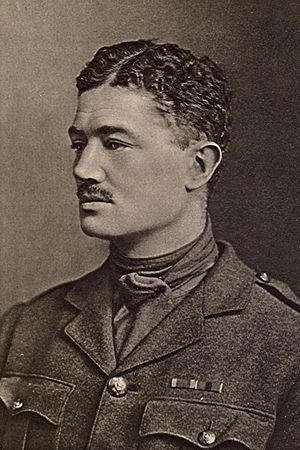Julian Grenfell facts for kids
Quick facts for kids
Julian Grenfell
|
|
|---|---|

Julian Grenfell in military uniform including his DSO ribbon
|
|
| Born | 30 March 1888 Westminster, London, England |
| Died | 26 May 1915 (aged 27) Boulogne, Pas-de-Calais, France |
| Allegiance | |
| Service/ |
Royal Dragoons |
| Years of service | 1910–1915 |
| Rank | Captain |
| Battles/wars | World War I |
| Awards | Distinguished Service Order |
| Relations | Captain Francis Octavius Grenfell VC (cousin) |
Julian Henry Francis Grenfell DSO (born March 30, 1888 – died May 26, 1915) was a British soldier. He was also a war poet during World War I.
Contents
Early Life and Education
Julian Grenfell was born in London, England. He was the oldest son of William Grenfell and Ethel Priscilla Fane.
He went to Eton College, a famous school. There, he became good friends with Denys Finch Hatton and Edward Horner. After Eton, he studied at Balliol College, Oxford. At Oxford, he was known for being very energetic and sometimes a bit wild. In his last year, Julian found his studies difficult. He felt very unhappy and anxious. After talking with his family, he decided to take a simpler degree.
After university, Julian loved outdoor activities. He spent a lot of time hunting and fishing. He also attended many high society parties with his mother. At one of these gatherings, he met Marjory Manners. She was the daughter of the Duke of Rutland. They wrote many letters to each other.
Military Service and War Heroism
Julian Grenfell joined the British Army in 1907. By 1910, he was part of the 1st (Royal) Dragoons regiment. He was first sent to India. He enjoyed hunting big animals there. However, he found army life a bit boring. Later, his regiment moved to South Africa. Julian did not like South Africa much.
In the summer of 1914, Julian wanted to leave the army. He planned to start a career in politics. But then World War I began in August. His regiment returned to the UK. They trained hard at Salisbury Plain before going to the war front.
The war quickly turned into trench warfare. This meant soldiers fought from long ditches. There was not much for cavalry (soldiers on horseback) to do. So, Julian's unit became like infantry soldiers (foot soldiers). Even with all the dangers, Julian wrote cheerful letters home.
Julian noticed that German snipers were causing many deaths. He used his hunting skills to help his men. He taught them how to crawl through "no-man's land" without being seen. This helped them attack German trenches and gather important information.
For his bravery, Julian was given the Distinguished Service Order in 1915. This award recognized his courage. On November 17, he managed to get behind enemy lines. He gathered excellent information about a planned enemy attack.
Injury and Death
On May 13, 1915, Julian was a captain. He was talking with General Campbell when a shell landed nearby. Both men were injured. Julian was taken to a hospital. At first, he seemed fine. But an X-ray showed he had a serious skull fracture and brain injury.
He had an operation. A few days later, doctors found his wound was infected. He had a second operation. After this, he was in constant pain. One of his arms became paralyzed. He grew more and more sleepy. His mother and father stayed by his side for ten days. Julian remembered happy times and recited poetry. He died on May 26, 1915, at age 27. His parents and sister were with him. He was buried in France. His mother covered his grave with oak leaves and wildflowers.
The day after he died, his most famous poem, Into Battle, was published in The Times newspaper.
Julian's younger brother, Gerald William (Billy) Grenfell, was killed in action on July 30, 1915. This happened near where Julian was wounded. The deaths of Julian and Billy were a terrible loss for their mother, Lady Ethel Desborough. She was deeply affected by their deaths for the rest of her life.
Remembering Julian Grenfell
On November 11, 1985, Julian Grenfell was honored. He was one of 16 Great War poets remembered on a stone in Westminster Abbey's Poets' Corner. The words on the stone were written by another war poet, Wilfred Owen. They say: "My subject is War, and the pity of War. The Poetry is in the pity."
Today, Julian Grenfell is best known for his poem "Into Battle." He wrote it in May 1915. The last lines of the poem are:
"The thundering line of battle stands,
And in the air Death moans and sings;
But Day shall clasp him with strong hands,
And Night shall fold him in soft wings."
 | William L. Dawson |
 | W. E. B. Du Bois |
 | Harry Belafonte |

